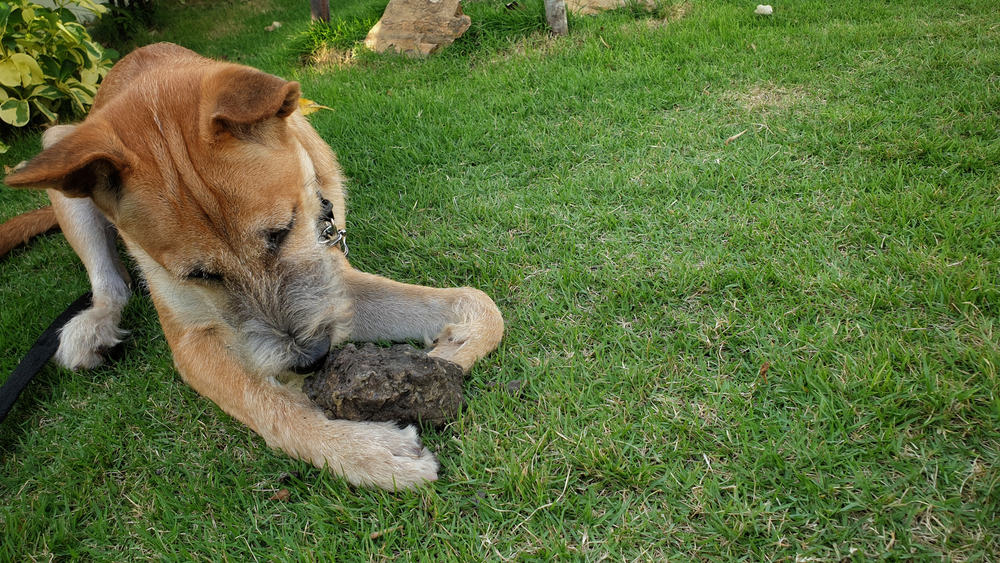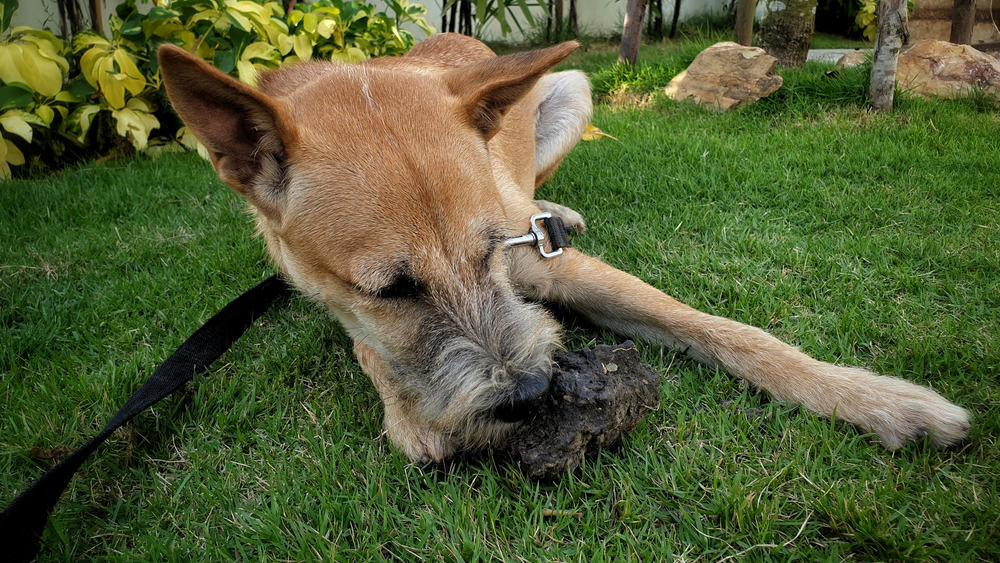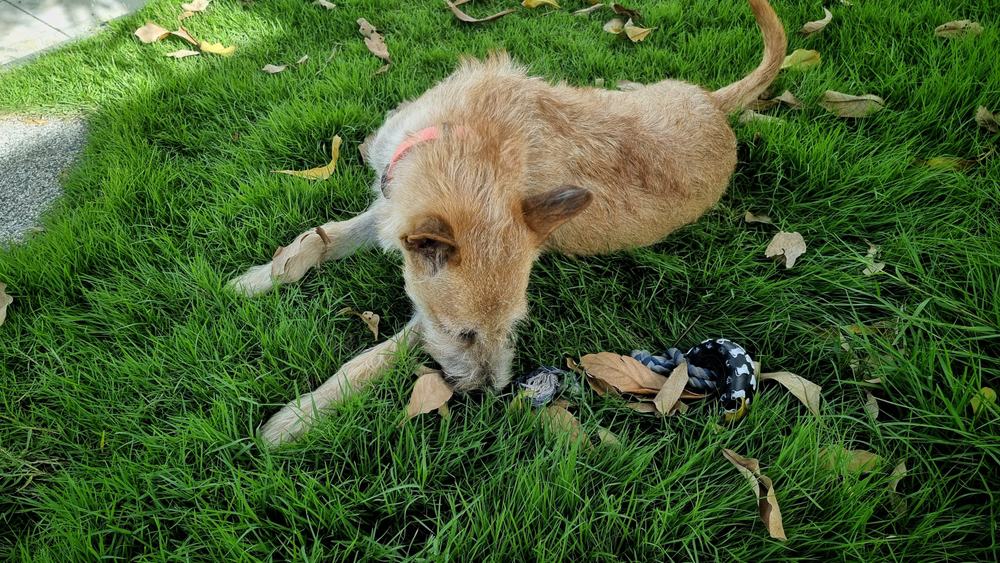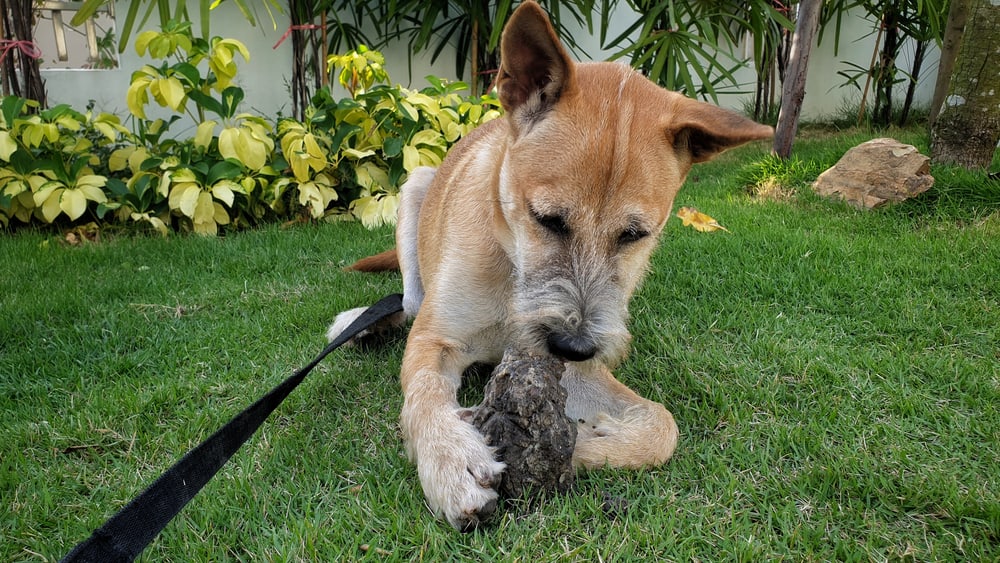As any dog owner will be aware, our furry companions are capable of some fairly weird – and sometimes pretty gross – behavior. Many dogs love picking up and eating all kinds of inappropriate items, and one thing they are notorious for consuming is soil.
Although it doesn’t rate as highly on the disgusting scale as munching on things like poop, eating earth can sometimes indicate more serious underlying conditions. So to help you understand what’s going on, here we discuss the question, why do dogs eat dirt?
If you’re looking for a preview of some of the things we’re going to be talking about, you can also check out this video before reading on.
Pica – eating non-food items
The practice of eating inappropriate non-food items is technically known as “pica”, and it can occur in dogs – as well as cats and even humans.
Dogs and cats often develop a taste for unusual things like grass, and sometimes people have been known to consume earth, metal objects and other similarly unsuitable items.
However, even in people, when we can simply ask why they are eating these strange things, it is often difficult to ascertain the reason. So when it comes to our pets, it can be even harder since they are unable to tell us what’s going on.
The scientific name for eating earth is “geophagia”, and it is particularly common in puppies. This is because, like human babies, puppies are keen to explore the world around them, and this often means tasting everything they find.
But while dirt-eating is considered normal behavior in puppies, when adult dogs engage in this habit – and especially when dogs develop the habit once they are fully grown – it may be a reason for concern.
So now let’s have a look at some of the most common reasons that can drive a dog to engage in geophagia.
Some possible reasons for dirt-eating
Just like pica or specifically geophagia in humans, there isn’t one single reason for dogs to eat dirt – rather, there can be several causes for this behavior. Here are some of the most common:
1. Mineral or nutritional imbalance
One common reason for dogs to start eating dirt is due to a mineral or nutritional imbalance.
It could be that the animal is simply not getting the required nutrients or minerals from its diet – perhaps due to low-quality dog food – but it could also be down to a medical condition that means the dog is unable to extract the minerals or nutrients from the food it eats.
For whatever reason, when the dog is unable to obtain nutrients or minerals from its food, it may then turn to eating dirt as a supplement.
Since this kind of imbalance is rare in healthy dogs, if it isn’t down to the dog’s diet, it could be an indication that something more serious is amiss, so a trip to see a vet would be highly recommended.
2. Anemia or chronic health problems
A similar issue could be that a dog is suffering from anemia or other chronic health problems, which could also cause the animal to start eating dirt.
Anemia is not an illness in itself but rather a symptom of many other conditions. It is characterized by a lack of red blood cells or hemoglobin in the blood and may be caused by internal or external bleeding, a reaction to medication, parasites, toxins and more.
Chronic diseases such as inflammatory bowel disease or hypothyroidism may be other issues that give rise to anemia in dogs.
Other symptoms of anemia include pale gums, lethargy, low energy, bruising, dark stool (an indication that blood is being passed) or blood in vomit.
Any of these symptoms alone could be a cause for worry, but when seen along with dirt-eating behavior, this is a strong indication that the dog needs to see a vet for tests.
3. Upset stomach or gastrointestinal problem
A dog may start eating dirt due to an upset stomach or gastroenteric issues. In this case, dogs are probably more likely to eat grass or plants than dirt, but this cause can’t be ruled out entirely.
4. Boredom or other psychological issues
Other than physical conditions that may cause dirt-eating in dogs, consuming soil can also be due to psychological reasons.
Dogs are intelligent social animals that require company and stimulation, so dogs that are left alone all day or that don’t interact with people or other dogs may develop psychological problems, much like humans can.
The same kind of reaction can occur when a dog suffers from anxiety or stress.
Again, dogs are probably more likely to turn to grass-eating than consuming dirt in this kind of situation, but geophagia is far from unknown, so boredom, anxiety or lack of interaction with people or dogs is another possible cause for eating dirt.
5. Just likes the taste
Finally, a dog may eat dirt simply because it likes the taste, although this is unlikely to cause a dog to consume large quantities of dirt over a long period.
This is more likely to be the case if a dog finds some “tasty” soil with something in it they like, for example, some buried food, but it’s is still something that’s worth checking out.
Is eating dirt a big problem?
Although you might think that dirt-eating is not such a big problem compared to other forms of pica like eating poop, it can potentially be an indication that your dog is suffering from a serious health condition.
Eating a small amount of dirt from time to time might not be such a major issue (although it still shouldn’t be encouraged!), it can often point to more serious problems than if a dog starts eating excrement or grass.
For this reason, if your dog eats more than just the occasional nibble of dirt, you are advised to take the dog to see a vet to get it checked out.
Furthermore, even if there are no serious underlying health issues, eating dirt in itself can be more dangerous for a dog than eating things like grass or feces, for the following reasons:
Impacted intestines
If a dog consumes larger quantities of dirt, especially in a short amount of time, it can build up in the dog’s gut, causing impacted intestines.
This is a serious condition that may require surgery to fix, so it’s something your dog is best off avoiding.
Digestive obstructions
Eating soil can lead to a dog’s digestive tract becoming blocked, and again, this can be a serious condition that is difficult to fix.
Damage to teeth
Dirt may contain hard items like stones, and if the dog chews on them, he may damage his teeth.
Damage to throat and digestive tract
Sharp stones along with other items like twigs may damage the dog’s throat and digestive tract by scratching or even puncturing them, which, for obvious reasons, is something you’ll want to prevent.
Pesticides and other toxins
Soil can contain chemical fertilizers, pesticides, rat poison and many other toxins that may be harmful to your pet, so this is another reason why dirt-eating should be discouraged.
Parasites
A dog that eats dirt may pick up parasites that are found in the ground, especially in areas where dogs or other animals defecate.
What should you do if your dog starts eating dirt?
As we’ve said, if your dog eats a little dirt occasionally, it probably won’t do her any harm and probably isn’t an indication that anything serious is wrong with your dog.
This is especially true of puppies since they like to explore their world by tasting everything and will probably quickly grow out of this kind of behavior.
However, if your dog begins displaying this kind of behavior more frequently, and especially if the dog consumes large quantities of earth or consumes it in a manic way, you should do what you can to find the reason for the behavior.
At the same time, look out for changes in the color or consistency of your dog’s stool since this is another indication that some kind of health issue may be to blame.
Try to establish why the dog is engaging in this kind of behavior and work out if it is likely to be due to a medical condition or a psychological problem.
If you’re not sure, the safest thing is always to take the dog to see a vet. A vet will be able to run the necessary tests on the dog and will be able to confirm illness in the dog or at least eliminate it as a possible cause.
Change the dog’s diet
Before taking your pet to a vet, you should also consider whether the dog’s diet is to blame. In the wild, dogs did not evolve to eat processed dried dog food, and many dogs that are fed mainly on this kind of product can develop deficiencies.
Try changing the dog’s diet, giving him food that includes at least some raw meat. Also, make sure the dog has some bones to chew on since they can provide a source of calcium.
Another point to consider is whether you are feeding the dog enough. Perhaps simply giving the dog a little more to eat may be enough to solve the dirt-eating problem.
Make sure the dog has enough stimulation
If you think your pet is not receiving enough attention or stimulation, make sure you take him out for regular walks and spend enough time playing with him – energetic games like frisbee or fetch are best.
Alleviating boredom, allowing the dog to get plenty of exercise and playing with him may often be enough to halt worrying dirt-eating behavior.
Breaking the habit
Even once you have identified what is causing your dog to eat dirt and taken steps to remedy it – whether it’s due to a medical condition, poor diet or simply loneliness or boredom – the dog may have already developed a dirt-eating habit, which you will then need to break.
Here are a few ideas and suggestions if this is the situation you’re facing:
-
Training and supervision
Breaking a dirt-eating habit is going to require training and supervision – and quite possibly a lot of patience.
Make sure you observe your dog when she is allowed into areas where she can find dirt to eat so you can call her away and distract her if she starts trying to eat it. At this point, you can also try training with commands like “come” and “leave it”.
When you call your dog away from the dirt, you should also use rewards like treats or a rub to reinforce the behavior.
At the same time, limit your dog’s access to dirt so she doesn’t have the opportunity to eat any.
With time and perseverance, this kind of training will help stop your dog eating dirt.
-
Use a leash
If your dog doesn’t respond to training, walking the dog on a leash so you can pull him away from dirt may be useful too. This can be an effective way of limiting your dog’s access to dirt.
-
Remove other opportunities to eat dirt
Removing potted plants from the house or placing them out of the reach of your dog is another strategy that can help prevent your dog from eating soil.
-
Don’t punish
Don’t punish your dog too harshly for eating dirt – working with positive reinforcement will be far more effective. Also, punishing your dog will make the dog stressed or anxious, which may even drive further dirt-eating behavior.
-
Behavioral professional
As a final resort, you may consider a behavioral specialist to work with your dog to solve the problem. These can be expensive, but in some cases, this may be the only way to break an ingrained dirt-eating habit.
Final words
Since dogs can’t tell us how they feel, it’s always important to investigate any new and unusual behavior since it could be a tell-tale sign that something is wrong with the animal – either in terms of an illness, nutritional imbalance, psychological problem or something else.
Eating a little dirt is probably not the end of the world, but if your dog starts eating it regularly or in large quantities, you should at least try to find out what is causing it. Once you know why your dog is eating dirt, you can then take steps to remedy this undesirable behavior.



